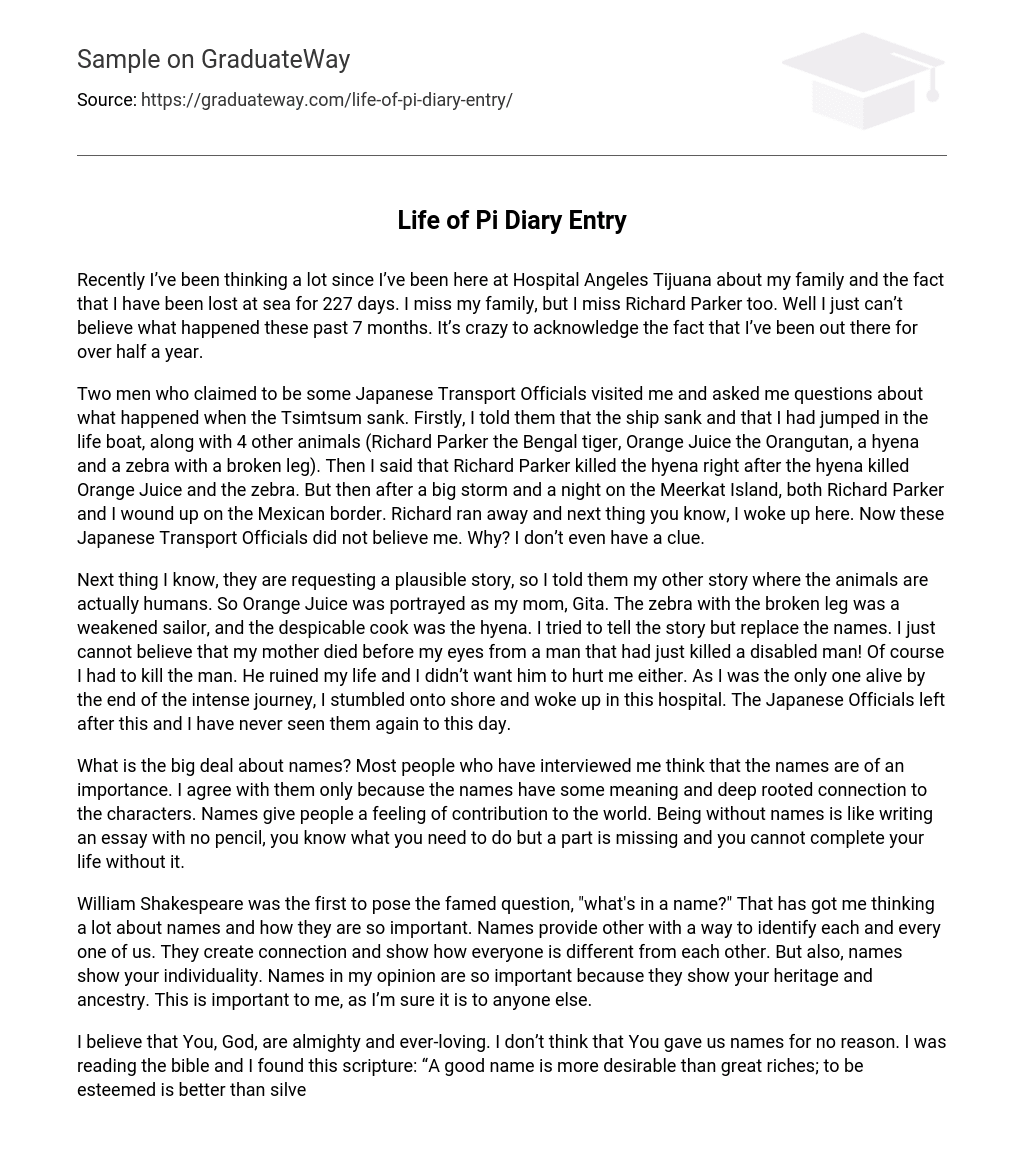Since arriving at Hospital Angeles Tijuana, my thoughts have revolved around my family and the 227 days I spent lost at sea. I long for both my family and Richard Parker. These past 7 months have been beyond belief, as it is surreal to accept the reality of being stranded for over half a year.
Two individuals claiming to be Japanese transport officials approached me for information regarding the events surrounding the sinking of the Tsimtsum. Initially, I informed them that the ship had indeed sunk, and that I had managed to escape on a lifeboat along with four other beings; Richard Parker, a Bengal tiger, Orange Juice, an Orangutan, a hyena, and a zebra with a broken leg. I further explained that following the hyena’s attack on Orange Juice and the zebra, Richard Parker swiftly killed the hyena. However, amidst a violent storm and an overnight stay on Meerkat Island, both Richard Parker and myself eventually ended up near the Mexican border. Richard fled from me, and the next thing I knew, I had awoken in my current reality. Curiously, these Japanese transport officials remained skeptical of my account, leaving me puzzled as to why they harbored doubt.
I shared my alternate account where animals were depicted as humans to fulfill their request for a believable tale. In this narrative, Orange Juice portrayed my mother, Gita, while the zebra with the injured leg represented a vulnerable sailor. The hyena embodied the detestable cook. Despite attempting to substitute names and create a plausible storyline, it was inconceivable that my mother perished in front of me at the hands of a man who had just killed a disabled individual.
Consequently, I had no choice but to eliminate this man who not only ruined my life but also posed a threat to me. As the sole survivor of this harrowing journey, I eventually washed up on shore and regained consciousness within this hospital. The Japanese Officials departed after this incident and have yet to return.
Names carry significance and hold importance, as believed by many interviewers. I share their belief that names are meaningful and deeply connected to individuals, providing a sense of purpose in the world. It’s comparable to attempting to write an essay without a pencil – you understand the task at hand but something essential is lacking, and life remains unfulfilled without it.
William Shakespeare was the first to ponder the meaning of a name, prompting me to contemplate the significance of names. They function as a way for people to recognize us and form relationships, highlighting our distinct qualities. Moreover, names unveil our individuality by showcasing our cultural background and family lineage. Personally, I hold the belief that names carry significant weight, a sentiment likely shared by others too.
I believe that You, God, are omnipotent and eternally affectionate. I do not think that You bestowed names upon us without purpose. While perusing the bible, I encountered this scripture: “A good name is more desirable than great riches; to be esteemed is better than silver or gold.” – Proverbs 22:1 (NIV). Although I didn’t completely grasp it at that moment, I persisted in my quest for answers and revelations. I discovered that names are a divine gift from You, God, and they possess Your power. Currently, Your Word is assisting me in fully understanding the significance of names. Your Word instructs me to surrender myself, imitate God, and live a life filled with love. However, there remains one question for You, God: Why do individuals create stereotypes based on others’ names? It appears unjust and inappropriate. Names should serve as unique identifiers rather than trigger false accusations. These individuals deserve the right to have a name that genuinely reflects their identity. Amma.. Appa.. Ravi.. Richard Parker.. I deeply miss all of you.





